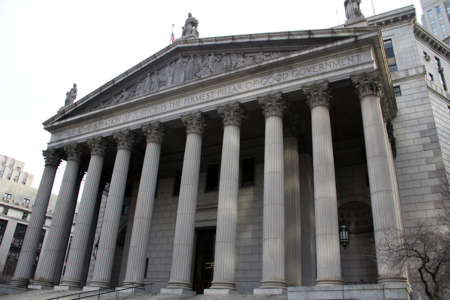
On April 25, the 2020 conviction of film magnate Harvey Weinstein for felony sex crimes was overturned by a New York Court of Appeals. Weinstein had been serving a 23-year sentence at Mohawk Correctional Facility in upstate New York. In 2022, Weinstein was also convicted in Los Angeles of charges, including rape, and sentenced to 16 years in prison, which he was expected to begin serving after the New York sentence. Weinstein’s legal team is also appealing the LA case. Here, Stanford criminal law expert Robert Weisberg discusses the case—why the conviction was overturned, and possible repercussions of the decision.

In a 4-3 decision, the NY Court of Appeals determined that Weinstein did not receive a fair trial. Can you explain the decision—and what went wrong in the original trial?
The charges in the New York trial were for crimes against three complainants. Weinstein was convicted for raping one of them and sexually assaulting another. The trial judge permitted the DA to introduce several other witnesses who testified to alleged sexual assaults by Weinstein, but those allegations were not part of the criminal charges in the trial. Under New York state’s century old “Molineux rule,” there are severe restrictions on the admissibility of so-called prior bad acts that are not part of the current charges. The concern is that the jury will infer that the defendant has a so-called propensity to commit acts of this sort, thereby distorting their judgment on his guilt about the formally charged crimes. The New York law has a few exceptions, such as where the prior acts are very distinctly relevant to a contested issue about the defendant’s intent, or to show a very distinctive pattern to his behavior. Here, the majority concluded that the trial judge crossed the line and thereby denied Weinstein a fair trial. Also, because the judge admonished Weinstein that if he testified on his own behalf, he would be subject to cross examination on these uncharged acts, the court ruled that Weinstein was unfairly deterred from exercising his right to testify.
Does the decision discount the importance of Weinstein’s prior bad acts? It seems like an affront to the women who testified and sought justice in the first place.
Well, the dissenting judges did think it was an affront [to the women who sought justice], and that the majority misunderstood the importance and relevance of this sort of prior bad act evidence in sexual assault cases where the decisive issue is the credibility of the complaining witnesses. The majority concedes this concern but insists that it’s outweighed by the importance of ensuring a fair trial case.
On the facts of this case, we have a very close question. The appellate judges were reviewing what was truly a “judgment call” by the trial judge. The standard used by the Court of Appeals was whether the trial judge had “abused his discretion.” In our legal system, that standard usually signals that an appellate court should be extremely reluctant to overturn a trial judge who was there on the ground to make difficult evidentiary calls. To say that he abused his discretion is to say that he was not only wrong but very egregiously wrong. That’s going worrisomely far.

Do you think NY DA Alvin Bragg will re-try the case?
Bragg will certainly be reluctant to admit defeat, and he’ll be under pressure to retry the case. He can do that if a new trial court is convinced that the slate can be wiped clean with the new jury pool. Also, given this ruling, Weinstein might want to testify in the second trial, and Bragg will have to consider how good or bad a witness he will be. Will he win sympathy because he is so clearly weak and frail from his illnesses?
How might this decision affect Weinstein’s appeal in LA, which is scheduled for May?
The simple legal answer is it won’t affect it at all: two different trials, two different sets of evidence and, most important, two different legal standards. California now has a rule that is much more generous to prosecutors in allowing so-called propensity evidence in sexual assault cases. Prior bad acts were alleged in Los Angeles, but their admissibility is more legitimate under California law. But one tricky thing about the California case is that apparently the jury was aware of the New York conviction, which happened earlier. This raises a pretty novel question. Might the California appellate court now say that the Los Angeles jury was in retrospect materially misinformed, given the New York reversal?
Do you think this decision will make it harder to bring future cases of this type?
Well, for sure in New York, where prosecutors will have to be much more careful in offering prior bad act evidence, so they will have to have more faith in the credibility of the formally complaining witnesses. And, although the New York ruling does not bind other states, it might affect prosecutorial judgment in states with laws like the Molineux rule.
Is there anything else you’d like to add?
Be prepared for a lot of punditry about how the Weinstein ruling could affect the Trump Manhattan case.
Robert Weisberg, JD ’79, the Edwin E. Huddleson, Jr. Professor of Law, works primarily in the field of criminal justice, writing and teaching in the areas of criminal law, criminal procedure, white collar crime, and sentencing policy. He also founded and now serves as faculty co-director of the Stanford Criminal Justice Center, which promotes and coordinates research and public policy programs on criminal law and the criminal justice system, including institutional examination of the police and correctional systems.